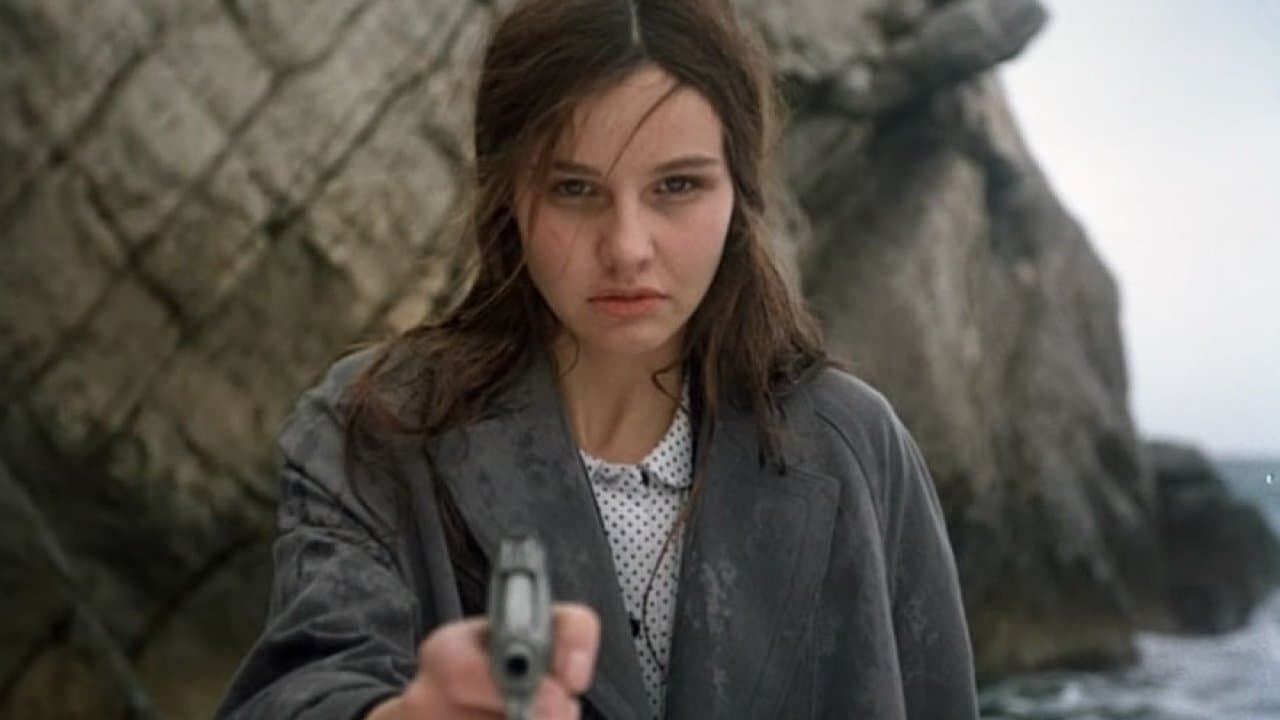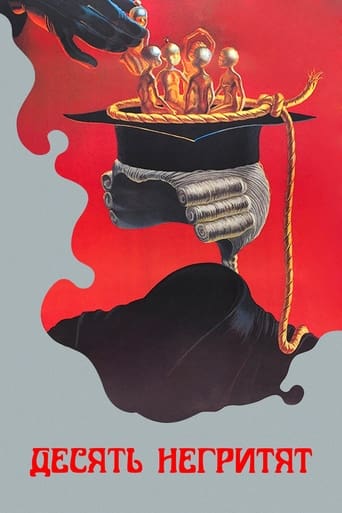Laikals
The greatest movie ever made..!
Ceticultsot
Beautiful, moving film.
SparkMore
n my opinion it was a great movie with some interesting elements, even though having some plot holes and the ending probably was just too messy and crammed together, but still fun to watch and not your casual movie that is similar to all other ones.
Seraherrera
The movie is wonderful and true, an act of love in all its contradictions and complexity
devinemandate
I am a fairly avid Agatha Christie fan, having read dozens of her works. Few of her books, if any, are better than her tale of ten doomed people who are marooned on an island and die one by one at the hand of an unseen foe (early on, they are all accused by a disembodied voice of committing murders that are untouchable by the law). I have been wishing to see an excellent film adaptation of And Then There Were None (or Ten Little Indians...or Ten Little N*****s if you're a real purist--in which case this edition may satisfy you even more thoroughly) for many years. I don't know how I did not know this Russian version existed until last night, but I am extremely happy I found it. It leaves the others, including the fairly charming 1945 edition, in the dust. (To be fair, I've seen the '45 and '65 edition, but not the English-language ones from the 70s and the 80s, which I've heard are not worth watching according to multiple sources.) Most of this review will come from the POV of someone who enjoys the Christie book (though I will be careful not to give away the biggest stuff).I'll start by saying the racist element is troubling for a modern American audience. The Russian title is along the lines of the original 1939 book title Ten Little N*****s, and in some versions of this film, the subtitles use this term consistently (the one I saw uses "Indians", which is admittedly still offensive, but considerably less so IMO). Certainly the figurines representing each of the guests are African in depiction. If you are able to look past this, it's the best version there is. But if not, it would be completely understandable. A couple of other negatives: the subtitles are often a bit comical or not grammatically accurate, but that part, for me, was easily overlooked after a few minutes in the face of its overwhelming positive qualities. Finally, while the music is generally pretty good, it occasionally became a bit over-the-top for my taste.The cast, direction, cinematography, screenplay, and atmosphere are all fantastic. The vast majority of the words (though obviously in Russian) are lifted directly from Christie's novel (if the subtitles I saw are to be believed), and the names and situations are almost exactly as in the book as well. These are tremendous positives, in my eyes, though it could be seen as being slavish to the original work. Two significant changes (there are others, but I feel they're in line with the original novel's intent): 1) Phillip Lombard has a dream about the East African natives he abandoned (this is hardly a spoiler as he is one of the only people to readily admit he is guilty of the crime of which he is accused). 2) Lombard and Vera Claythorne have sex (somewhat disturbing, almost non-consensual sex). While there is certainly some sexual tension between them in the novel, it does not come close to boiling over like in this movie. #1 made me giggle a time or two, while #2 was perfectly fine for me, right in line with the atmosphere and situation established in the movie.As far as it goes, I'd say I would have had the audience discover who the killer was about 90 seconds later than this movie does, and I'd have had the killer linger in a little more detail about how they did it, but the fact that they have more or less kept the novel's ending (instead of the play/movie adaptations' endings since) is such a big win for me, the Christie fan viewer.I cannot recommend this work enough if you want to see a good Christie adaptation. I'd say my previous favorite was the '70s Death on the Nile with Peter Ustinov (though Suchet is a better Poirot) and Mia Farrow, but that pales significantly in the face of the universally good performances and excellent atmosphere of Desyat negrityat.
sanddragon939
Having seen all the four British adaptations of Agatha Christie's bestselling novel 'And Then There were None' AKA 'Ten Little Indians', I decided to turn my attention to the Soviet adaptation of this great work-'Desyat Negrityat'. For me, the biggest lure of this film was the fact that, unlike the English adaptations, it retained the dark and disturbing ending of the original work.As I had expected, this film WAS a much more faithful adaptation of the book than any other, in EVERY respect. And therein lies one of its faults. With virtually every scene in the novel included, the pacing off this film suffers, especially in the first half; there are long stretches of expository dialogue which, while informative vis a vi the plot, leaves the viewer yearning for action. Where the film succeeds however, is firstly, in the setting-the sheer modern simplicity of the house on Indian Island belies the horrifying deaths which occur within its walls one after the other, a juxtaposition which is chilling indeed. Secondly, unlike any of the other adaptations, this film does a great job exploring the inner torment and psychological conflicts of the characters under siege...the character of 'Vera Claythorne' in particular; adding a depth to the story lacking in previous theatrical renditions.On the whole, 'Desyat Negrityat' has its flaws, but it is a great watch nonetheless...and leaves one hoping for an English adaptation of the novel that is nearly as faithful!
Sabrina890
I believe listing just one, single thing about this adaptation that makes it the best ATTWN adaptation would be doing this film a great injustice, so it's difficult for me to find a place to begin. I suppose I'll start by describing the plot in case there's anyone who's been living under a rock: Ten strangers are gathered to an isolated location, are informed by a gramophone record that they're all murderers who will receive swift retribution, and are killed off one by one in accordance to the gruesome nursery rhyme, Ten Little Indian--sorry, Ten Little Negro Boys. Call the title (which translates to Ten Little Negro Boys) politically incorrect, but the original title was politically incorrect. Call the characters nasty, but they were nasty in the book. Call the ending depressing, but the ending was depressing in the book. Call this movie a lot of things, but never call it unfaithful. Unlike the other adaptations, which watered down the things that made Agatha Christie's original story a masterpiece, this adaptation is not afraid to go there. It's not afraid to expose the plot for what it is or the characters for whom they are, which is what makes it stand out from the other adaptations. For instance, take Vera Claythorne. The other adaptations portray her as a bright-eyed, oh-so-innocent young lady who would never do anything bad, never. Here, she only LOOKS innocent, but as revealed in her flashbacks, she is anything but. Tatyana Drubich captures the character of Vera Claythorne perfectly, portraying her as a cold-hearted monster in her flashbacks when she's allowing her pupil to swim out to sea and drown, and then portraying her as a human and sympathetic character when she has her breakdown at the end, realizing that although Cyril had her lover's money, he was only an innocent child who hadn't yet lived his life. In the book, the characters merely speak of nightmares they had; in the movie, you see them. For instance, Lombard dreams of traveling through a jungle, only to be confronted by a large tribe man whom Lombard fights off. The tribe man falls and has a blank, horrible look on his face. Lombard opens his mouth to scream but can't (you know that awful feeling dreams?) and wakes up sweating and takes a drink. Basically, the movie is extremely faithful to the book, taking only one, major liberty: The infamous bedroom scene between Lombard and Vera, a scene that gives me the chills because what happens between them borderlines between an intense love-making session and rape. It shows the characters at their maddest, showing two people who were having a civilized conversation at the beginning of the movie now behaving like rabbits in mating season, and the two actors play the moment beautifully. (I have to wonder, though, would Agatha Christie view it that way?) And last but not least, there's the part that many users have mentioned already but I might as well mention it: Instead of using the romantic, happy ending from the play, this version uses the dark, downbeat ending of the novel, which is what gives this adaptation its reputation for being unafraid to 'go there'. It goes to show that Stanislav Govorukhin read the novel, not the play, and saw a potentially great ending for a great movie. (Besides, a happy ending for Lombard and Vera in this adaptation would be kind of awkward, considering, you know, that little moment of insanity) Overall, this is a superb adaptation that deserves its reputation amongst Agatha Christie fans.
tasha-kalinichenko
I've seen many adaptations of this story but this one is really unrivaled. From the very beginning, you can see the talent of the director. When he's filming the guests waiting to depart, you can feel the tension among them, and the culpability too. On the contrary of the other adaptations, this movie doesn't only show the action, the murder series, but also (and it seemed capital to me) what's in the victims' minds. I appreciated in particular the flashes back. Personally, I only deplore the location. The place where the movie was shot is too well known, and doesn't fit with the idea one could have of the island. To adapt such a famous book is always tricky, but not for Govorukhin ! Mankiewicz couldn't have done better.

